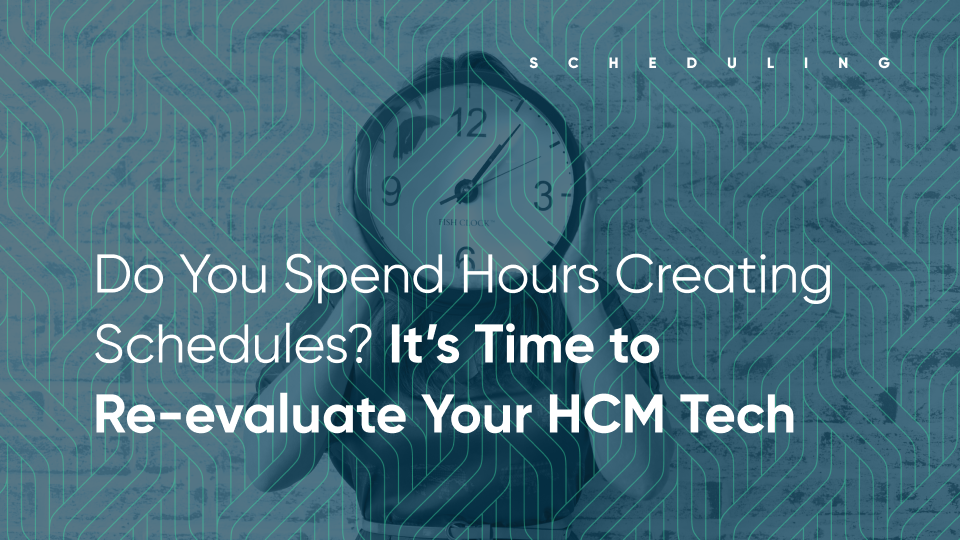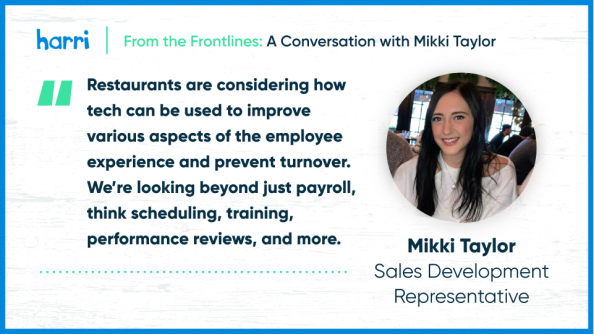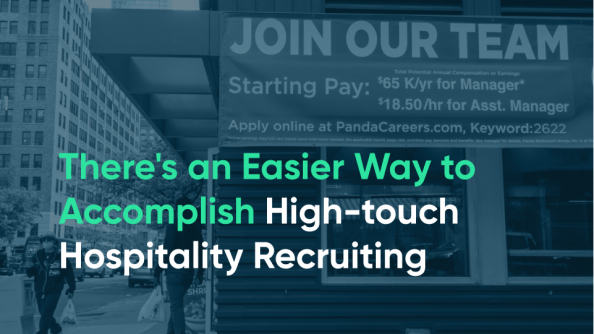Do You Spend Hours Creating Schedules? It’s Time to Re-evaluate Your HCM Tech

- By Harri Insider Team | June 18, 2021
Hospitality operators are no stranger to messy schedules — we work in an unpredictable industry where labor demands are constantly changing based on customer flow. That being said, it doesn’t mean you should go into scheduling without a game plan.
Between child labor laws, the Fair Labor Standards Act (FLSA), Fair Workweek predictive scheduling laws, and the up-and-coming “Just Cause” employment protections, managers have a lot to be aware of when creating employee schedules.
If you’re spending over an hour strategizing labor to accommodate sales needs, compliance requirements, and employee preferences, then you’re HCM processes are either:
- Fragmented
- Inefficient
- All of the above
In a rapidly evolving industry that’s also grappling with a massive talent shortage, operators can’t afford to settle for less-than-perfect people operations. If your managers struggle with creating labor-efficient, compliant schedules, it’s time to re-evaluate your HCM processes and fill the gaps with the right tech stack.
Hospitality labor laws: what are your compliance responsibilities?
We outlined a quick overview of major hospitality compliance considerations and the related HCM data you need to be efficient.
Fair Workweek, also known as Predictive Scheduling or Secure Scheduling, aims to create stable, predictable schedules for hourly workers. Although these laws are extremely well-intended, they require massive operational overhauls for most hospitality operators, beginning with scheduling.
Fair Workweek requirements vary at the local level, but core concepts remain the same:
Advanced notice scheduling
Employers must provide employees schedules in advance, typically 10 to 14 days in advance.
Right to rest periods
Employees cannot work “clopening” shifts, meaning they can’t work close-to-open shifts. To prevent this, employers must give employees 8 to 10 hours in-between shifts.
Premium payments to hourly employees
If an employer violates any of the above requirements, they’re required to pay affected employees a premium payment. Payment range varies per violation and how last-minute the changes are. In some instances, such as asking an employee to stay later on a shift, they may be entitled to a premium payment and overtime pay.
Good faith estimates
Employers must provide employees with a good faith estimate of expected working hours. IF an employee’s schedule starts to differ from the good faith estimate, the employer will need to issue a new good faith estimate.
And if we’re throwing “just cause” employment protection into the mix, which is an add-on to NYC Fair Workweek, employers aren’t permitted to reduce employee schedules by 15% else they risk non-compliance lawsuits.
Must-track HCM data for Fair Workweek
- Employee shift days
- Employee shift start and end times
- Hours worked per employee per week
- Overtime hours worked and premium payments owed
Child labor laws
Minors are subject to varying levels of scheduling restrictions based on their age and the time of year. Combining these strict requirements with working paper renewal requirements gives hospitality operators a handful of separate (but related) logistics to keep track of.
Age-based scheduling
For example, a 16 year old worker may only be able to work until 7 pm whereas a 17 year old could work until 8 pm. Once that worker turns 18, they can be scheduled whenever.
Calendar-based scheduling
After Memorial Day, those 16 and 17-year old workers can work later since school is out (while still adhering to some form of age-based scheduling), but they need to revert to the original scheduling restrictions come Labor Day.
Some states may also require minors to get off the clock earlier on weekdays than on weekends to be mindful of homework and other school requirements.
Hour limits
Depending on the minor’s age and the time of year, they may only be permitted to work a certain number of hours per week.
Must-track HCM data for child labor laws
- Employee start date (for working paper renewal)
- Employee shift days
- Employee shift start and end times
- Time and attendance – did they show up for a shift and contribute to their weekly working hours limit?
Your HCM systems need to talk to one another
Your HCM systems need to talk to one another, or better yet..,be integrated into one singular platform.
Imagine manually managing all of those labor law requirements in a fragmented tech environment? Especially when different nuances stack with one another? It’s financially unsustainable and prone to errors.
Hospitality needs a system that can connect the dots between disparate HCM processes to enable truly effective, labor-efficient operations.
Fully compliant schedules doesn’t always mean that you’ll have the right people in the right places at the right time. But you shouldn’t have to sacrifice performance for compliance — both are absolutely necessary for successful restaurant operations.
An intelligent scheduling platform should, first and foremost, take federal and local compliance requirements into consideration.Whether you can’t schedule an employee past 7 pm or need to include a 30-minute unpaid break for every 4-hour shift, those requirements should be accommodated into your platform. After all, managers shouldn’t be compliance experts.
Harri takes this concept of compliance and pushes it a step further by integrating historic data for truly labor-efficient schedules.
Maybe your business tends to experience high sit-down service demands on Sunday afternoons when it’s raining. Perhaps your bar often experiences lulls Fridays from 6-7 pm, creating an opportunity to assign a bartender to a different task. Harri will take these situations, amongst others, to provide accurate labor suggestions during the schedule building process.
But the scheduling insights don’t end there.
Position-based scheduling gives your team the ability to allocate labor within a certain threshold based on employee skills, availability, and shift preferences…all while staying within the bounds of labor law requirements.
All of this empowers managers to optimize shift days, start and end times, overtime windows, and more in a way that meets the needs of employees, customers, and labor offices. And because manual work is minimized, managers have more time to focus on creating a great gusset experience rather than solving the puzzle that is restaurant scheduling.
Non-compliance alerts
Hospitality scheduling has become a full-time job. Between child labor laws and complex Fair Workweek requirements, your managers can’t be expected to create perfectly compliant schedules on top of their hundreds of other in-store responsibilities.
That’s where a compliance platform like Harri comes into play.
Because federal, state, and local level compliance is baked into the core of our system, managers receive automatic notifications if a non-compliant action is about to occur…or prevent them from creating non-compliant schedules altogether.
Say you have a 17-year old employee that’s been working night shifts over the summer. A manager might mistakenly schedule them for a night shift after Labor Day which goes against child labor laws. It’s easy to overlook these things once you’ve found a labor strategy that works for you. Harri’s scheduling platform will prevent the manager from scheduling an underage employee when they’re not allowed to and instead will only offer availability during state-permitted working times.
Running short on labor and need to ask an employee to work a clopening shift? Harri will warn managers that failing to give an employee a “right to rest” will incur a premium payment, empowering managers to make better-informed scheduling decisions.
Harri’s hospitality compliance alerts include:
- If an advanced notice schedules due
- When changes are made to an already-posted schedule clopening
- When an employee’s schedule differs significantly from their good faith estimate over a long period of time
- If good faith estimates need to be renewed
- When a minor’s working papers are expiring
- If an employee is scheduled for a
- If a minor is scheduled during a day/time they’re not allowed to work
- If a minor’s weekly schedule exceeds their permitted number of working hours
Consistent alerts aren’t just a compliance buffer, they also save managers time and effort in navigating complex labor laws while simultaneously decreasing compliance costs. As labor laws constantly change, compliance alerts are an invaluable tool to any business looking to create cost-efficient operations — but they must connect every aspect of HCM data, from scheduling to time and attendance, to be fully effective.
Streamline your scheduling processes for today’s labor needs
Between the labor shortage, looming compliance requirements, and ever-demanding customers, hospitality operators have a lot to juggle in the labor department alone.
But until you begin to connect critical employee workforce data with your scheduling and payroll systems, your teams will always struggle with manual work and ineffective scheduling.
While tech is certainly the answer, it must be thoughtfully applied. Hospitality is a people-driven industry, and as such, we’re enormously dependent on the success of our people. That starts and ends with the employee schedule.
An all-in-one HCM platform built specifically for the needs of hospitality is a must-have in creating effective and compliant schedules to reduce costs and maximize business outputs. Learn how Harri’s fully integrated platform enables operational success from the bottom up.





















